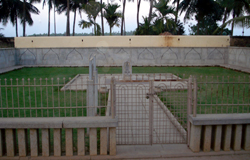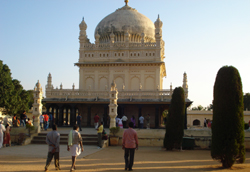|
Srirangapatana an island citadel on the River Cauvery in the Mandya district
of Karnataka State is known for its religious, cultural and historic importance.
Located 19 km northeast of Mysore city, beside the Mysore-Bangalore highway
its name is derived from the temple of Sri Ranganatha, located within
the walls of the Fort. A major tourist destination in Mysore, Srirangapatana
attracting a large number of visitors.
The island town of Srirangapatana has a mosque, a temple,
Tipus summer palace; Daria Daulat ornamented with wall paintings and Gumbaz
and his Mausoleum with ivory inlaid doors. Situated on a low rocky island
5 km long 1km wide the middle of the Kaveri River, it was built under
the Vijayanagar Kings in 1454. The fort was witnessed the battle fought
here by the British forces under Lorud Cornwallis and General Harris in
their attempt to subdue Tipu. After this battle the British established
their supremacy in Southern India.
Srirangapatna can be divided into two parts. One part
of the island is dominated by the fort complex and places and the second
part dominates the Ranganathaswamy temple and Juma Masjid. Tourists can
complete their visit to Srirangapatna within 3 hours.
Sri Ranganatha Temple
It is a large complex with two concentric enclosures. One among
the Pancharanga kshetram (Five holy places of Lord Ranganatha - others
are Srirangam, Tiruvindalur, Kumbakonam and Koyiladi) along the river
Kaveri, Sri Ranganatha Temple is said to have been built by the Chieftain
Thirumalaiah in 894 AD was substantially resrtored in the 19th century.
One of the most important Vaishnavite centres of pilgrimage
in southern India, it has huge walls surrounding it, depicting ancient
architecture. Just outside of the complex walls is a large chariot with
wooden panels. One can enter the temple complex through the eastern imposing
gopura. It is a five storeyed pyramidal tower. Dedicated to Lord
Vishnu it has approached through a succession of columned halls and an
open court with a glided lamp column. One of the main attractions of this
temple is a reclining image of Lord Vishnu on the coils of the Snake Ananta.
Famous for its exquisite carvings and beautiful architecture
in Hoysala style, Hyder Ali believed to have made contributions and donations
to the temple. Two pillars depicting Vishnu in 24 forms with their names
arranged are noteworthy. Besides the shrine of Lord Vishnu, there are
many other shrines inside the temple dedicated to Panchamukha Hanuman,
Sri Krishna, Lord Srinivasa, Alwars and Gurus of Vaishanava faith.
Puja timings : from 8 to 9.30 am and 7 to 8 pm.
A festival Kotarothsava, an annual rath yatra is held in January, attracting
thousands of devotees.
Jama Masjid
Also known as Masjid-e-Ala it was built by Tipu Sultan, in 1787
A.D. It is a beautiful 2 storeyed building with two lofty minarets and
a flight of about 200 steps leads to the top of each minarets. It also
has Persian inscriptions mentions the date of the construction and others,
the extracts from the Holy Quran.
Lal Mahal
Situated near to the Ranganatha Temple is a ruined Tipu's Palace.
According to many it was once a very beautiful structure. The palace was
used by the British as their secretariat till 1867, after the death of
Tipu.
 Tippu's
Death Place Tippu's
Death Place
It is here where Tipu Sultan fell, betrayed by his own men during
the fourth battle of Srirangapatna. His body lay there for two days before
it was noticed by the locals. A cannon ball, a silent reminder of Tipu’s
last battle (May 4, 1799). There is a Stone Tablet where it is engraved,
'The body of Tipu Sultan was found here'.
Colonel Bailey’s Dungeon
Situated north of Ranganatha Swamy Temple, it was named after
Colonel Bailey who died here in 1782 AD. This dungeon was used to imprison
British prisoners like Captain Baird and Rulay, Colonel Brithwhite Sampson,
Frazer and Lindsay. In the dungeon, the prisoners were chained to the
stone slabs fixed on the east, north and the west walls.
Daria Daulat Bagh
An extremely well maintained, Daria Daulat Bagh is situated 500
m south of the Fort. Built in 1784 by Tipu as a pleasure place it houses
a durbar hall, resort and dining hall. . The main building which stands
in the middle of a well maintained garden. The building has triple arcades
surrounded by a verandah with tall columns which are carved with murals
depict battles including Haider Ali's victory over the British. The Mughal
art is seen in the carved woodwork and painted designs.
The small museum upstairs exhibits maps, portraits and topographical scenes
associated with Tipu Sultan, eighteen pencil sketches, Coins of various
denominations and medals of different metals, costumes, furniture, arms,
etc. Maintained by the Archaeological Survey of India it is open daily.
Entry Fee : Rs 5/- per adult and camera fee of Rs 25/-.
Abbe Dubois church
It is near to Daria Daulat Bagh just 1.5 km away. It was built
by a French Missionery who worked here in 1799 -1823. Near to this a British
Cemetery which has memorials of British Soldiers.
 The
Gumbaz ( Mausoleum) The
Gumbaz ( Mausoleum)
The white domed Gumbaz is the burial chamber of Tipu Sultan,
his father Haider Ali and mother Fatima Begum. Built by Tipu Sultan for
his parents between 1782-84 A.D, it is a square tomb chamber with a dome.
The monument stands in a garden with cypress trees. The entrance is from
the east through an arched gate . The tomb consists of an imposing domed
chamber surrounded by verandah roofed with angled eaves. It houses Tipu's
tiger stripe emblem and his swords and shields.. The dome is raised high
on a square chamber. Both the bodies of Haider Ali and Tippu Sultan are
resting in a crypt beneath the cenotaphs. The ebony and ivory doors were
donated in 1855 by Lord Dalhousie, the Viceroy of India.
Dodda Gosai Ghat
Situated on the banks of the River Cauvery, it is famous for
shooting song and dance sequences of regional films. A beautiful temple
near to this ghat.
|

